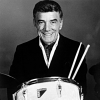Home » Jazz Musicians » Sonny Greer
Sonny Greer
Despite the fact that he was an important member of one of the most famous bands in the history of jazz, and during its finest period, drummer Sonny Greer has not been especially well served by jazz historians.
He was born William Alexander Greer on 13 December, probably in 1895, in Long Branch, New Jersey. It was in his home state that he made his first professional appearances but by 1919 he was playing in Washington, DC. It was there that he first encountered a local musician who was to change not only the drummer's life, but the lives of everyone who played in his band over the coming decades. This was Duke Ellington. In the early 1920s Greer and Ellington played often together in Washington and in New City. The drummer became one of Ellington's closest acquaintances, and was an integral part of the music the bandleader was creating. Greer was an original member of Duke's Washingtonians which was a five-piece group at its start. A subtle player, whose relaxed style sometimes drifted into casualness and poor timekeeping, Greer's style, especially when using brushes, was ideally suited to the band's seemingly effortless swing and he contributed much to the tonal palette that Ellington needed for in order to realize his compositions. The timekeeping lapses were underpinned in the early years by guitarist Freddie Guy and a little later on by bassist Jimmy Blanton but he played his own part in generating the easy, loping swing that the band generated.
Visually, Greer was flamboyant, surrounding himself with a spectacular array of gleaming percussion instruments, including bells, gongs, timpani and xylophone. For all the quantity of instruments, however, Greer's aural contribution was muted; he never thundered, preferring to add color to the Ellington band's sound and to supply a pulse that was felt rather than heard.
Only rarely during the 1930s and 1940s did Greer work outside the aegis of Ellington. Apart from a few small group sessions led by other band mates, and an appearance on one of Lionel Hampton's famous Victor recording sessions, his career was spent inside the Ellington orchestra. By the end of the 1940s, however, Greer raised the ire of Ellington, who tolerated more indiscretions from his sidemen than almost any fellow bandleaders of the era. Greer never shook off the smooth-talking, sharp-dressing, hard-drinking persona that had been a part of him, most of that persona was not detrimental to his playing, but the drinking was. Gradually, his on-stage behavior deteriorated and in 1951 Ellington was forced to ask him to leave the band.
Read moreTags
The Duke Ellington Carnegie Hall Concerts: January 1943

by Chuck Lenatti
Duke Ellington was one of the most popular and successful jazz musicians of the first half of the 20th century and according to composer Gunther Schuller and musicologist and historian Barry Kernfeld, “the most significant composer of the genre." Radio broadcasts from his residency at New York's Cotton Club beginning in 1927 extended Ellington's orchestra's national exposure and a parade of hit records, from “East St. Louis Toodle-Oo" in 1926 to “C Jam Blues" in 1942, among many ...
Continue ReadingGhosts In The Machine, Part 4: Jazz Musicians And Popular Music

by Kurt Ellenberger
Part 1 | Part 2 | Part 3 | Part 4 | Part 5 Part 4: Jazz in the Trenches In my previous articles, I detailed the enormous influence that jazz musicians have had on popular music since the 1960s. This may, early on, have been a matter of survival; as the popularity of jazz waned, so did the income potential, as detailed in Marc Meyers' noteworthy recent addition to the social history of jazz, Why Jazz Happened. ...
Continue ReadingJazz Musician of the Day: Sonny Greer

Source:
Michael Ricci
All About Jazz is celebrating Sonny Greer's birthday today!
JAZZ MUSICIAN OF THE DAY Sonny Greer
Sonny Greer - drums, recording artist, bandleader (1895-1982) Despite the fact that he was an important member of one of the most famous bands in the history of jazz, and during its finest period... more
Website | Videos | Articles
Join Sonny Greer's fan network
Put AAJ's Musician of the Day box on your ...
read more




























